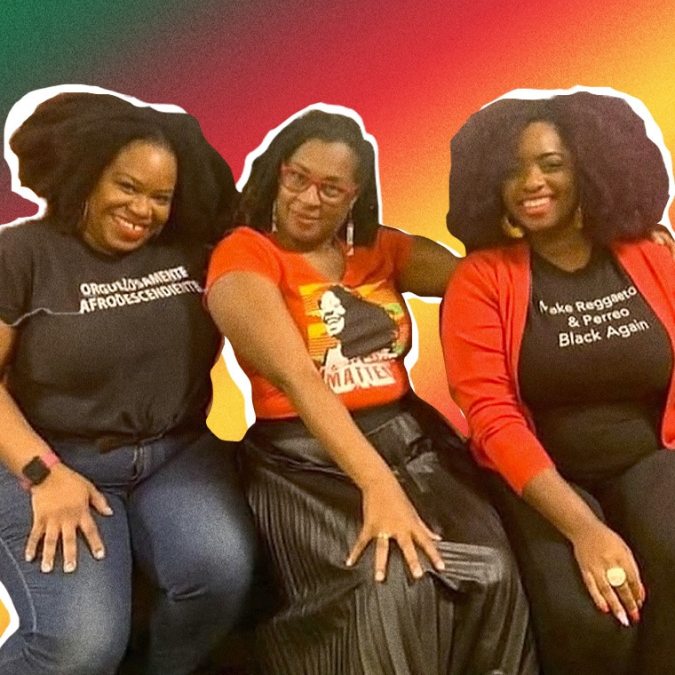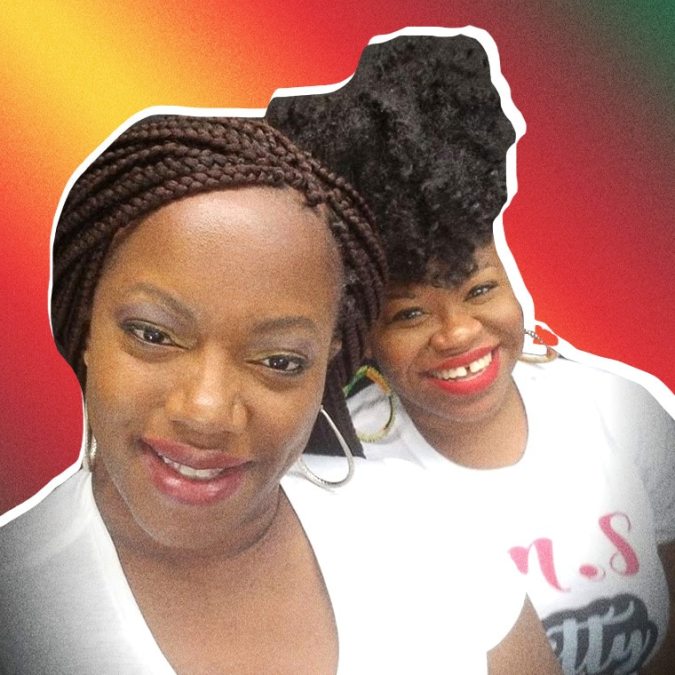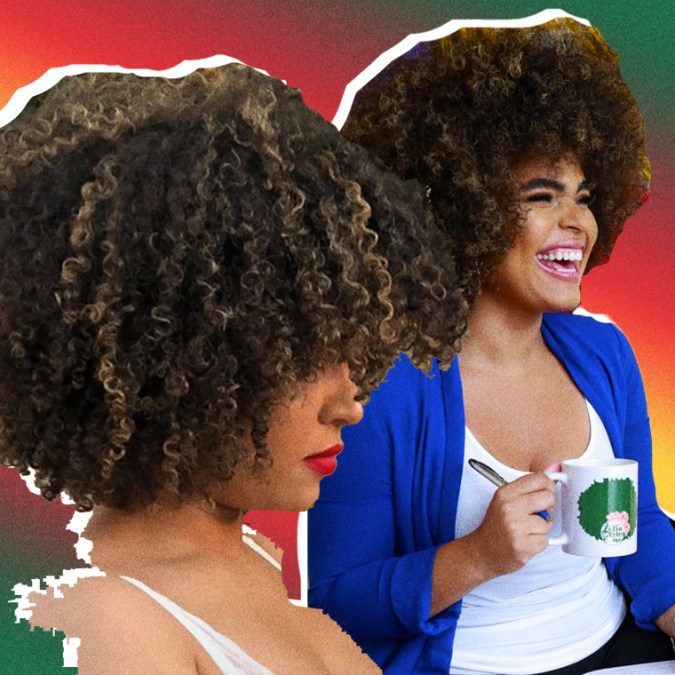In 2020, phrases like ‘hay que mejorar la raza’ (we have to better the race) and ‘pelo malo’ (bad hair) are still prevalent in many Latino homes. Meanwhile, issues that affect Black Latinx communities (e.g., lack of quality in infrastructure, economic inequality and discrimination) are still a major focus in the fight for equality. Although terms like “Afro-Latinx” have garnered a lot of attention in the last few years, the marginalized group continues to face anti-Blackness at work and educational spaces.
That being said, non-Black Latinx have had to work towards unlearning many of the anti-Black ideologies that have been generationally reinforced through media and politics. In addition to unlearning, Afro-descendants of different backgrounds and occupations often find themselves educating others on White and Brown privilege and how non-Black Latinxs have historically perpetuated anti-Blackness in the Latinx community.
We spoke to women who are raising Black consciousness on their platforms and initiatives about the ways in which they’re working to decolonize and unlearn anti-Blackness.
The Workshop that Deconstructs Anti-Blackness

The workshop spawns from their Caña Negra platform created by the Central-American activists. They were well aware that the U.S. was late to the Afro-Latinx conversation and wanted to create a space that challenged the “awakening” narrative.

“What I am seeing is that those who are indeed newly awakened, centered—once again pushing to the margins, lifelong Black Latin Americans who have been in the trenches about these topics but were not being listened to,” says co-founder and director of AfroLatinx Travel Dash Harris Machado. The reality inspired the name of the series Caña Negra.
“[We] wanted to make a strong and clear statement that we are lifelong Black women. There was no ‘realizing’ or an ‘epiphany’ into Blackness. We had no choice or an ‘opt-out’ in the matter as many new U.S. AfroLatinos seemed to have.”
Non-Black individuals who attend the training are expected to make the effort and conscious decision to deprogram and decolonize their minds.

“First thing is to pay Black people fairly for their contributions in this labor. Economic justice is racial justice. And at the same time, Black people do not owe you this labor. I challenge non-Black Latin Americans to do this work themselves, without calling in their ‘Black friend’ for assistance,” says Harris Machado.
The training provides resources that assist in the learning process, time for group and individual reflection, and to the labor of re-educating and de-conditioning themselves and offering that same space for their family, friend and colleague circles.
It Takes Time and Letting Go

Janvieve Williams-Comrie, Evelyn Alvarez, and Dash Harris Machado created their Anti-Blackness in the Latinx Community Training in 2019 to critically address anti-Blackness in the Latinx community.

Being that the anti-Black mindset is shaped over time, it is impossible to unlearn anti-Blackness from one day to another.
“Held beliefs have kept people safe, and there is a way to honor that and introduce new ideologies and beliefs. Be okay with walking away from some people and fights,” says social entrepreneur and founder of Black Magic Doulas—an NYC-based doula team that offers resources for expecting families—Evelyn Alvarez.
Co-founder and director of AfroResistance—an organization that works to educate the diaspora throughout the Americas on racial justice—Janvieve Williams-Comrie, explains that it’s also okay to let go.

“You may not change your abuela overnight, but she is listening to you. Letting go and outgrowing relationships is part of this process no matter what stage one is at. It’s just a part and it is hard and can be challenging but at the same time freeing.”
“There is also a level of forgiveness and grace. We have to remember to extend to our elders, specifically our Black elders who have been victimized in this white supremacist complex,” adds Harris. “Many of their anti-Black attitudes, behaviors, and norms were survival.”
Redefining What “Beauty” Means in the Latinx Community

The natural hair movement has grown in numbers in Latin America over the past few years. In the Dominican Republic and it’s diaspora, Black women are redefining what beauty means to them, but despite this rise, the discrimination against afro-textured hair is still vastly common.

Thanks to spaces like Miss Rizos, the first all-natural hair salon on the island, women are rejecting European beauty standards.
“I feel like every single part of the black woman has been picked apart and deemed not beautiful for so many years,” says Sofia Reyes, owner of the natural hair store Sofia Styles Me.
In 2017, before launching her business, Reyes was the Operations Manager and Social Impact Coordinator at Miss Rizos.
“I’d see how some of our clients would be so excited to finally get their big chop and how liberated they would feel at the moment… just to come back crying at their next appointment because they were fired, suspended from school, or dumped by their significant others,” says Reyes.
“It’s so powerful to see a woman own their natural beauty in a society that consistently tells you, explicitly and implicitly, that you are not meeting the beauty standard—the eurocentric beauty standard,” she says. Her store’s “Don’t Touch My Crown” long-sleeve tee is not only an ode to Solange’s “Don’t Touch My Hair” but an appreciation to The CROWN Act, which prohibits discrimination based on hairstyle and hair texture.
For many, terms like ‘pelo malo’ have become the conversation starter that deconstructs anti-blackness in family homes.
“The first time my family began having conversations about race and anti-blackness was when I chose to transition into natural hair in 2012. Cutting my hair over 12 inches and resisting salon culture triggered older family members to begrudgingly acknowledge my negritud,” says Danyeli Rodriguez Del Orbe, writer of Periodicos de Ayer. The spoken word artist told her family she would no longer apply heat on her hair a few weeks later.
“My aunt grabbed onto my edges and said, “Mirate ahora. Vas a parecer una maldita negra” (Look at yourself now, looking like a fucking Black girl). Almost bursting to tears, Danyeli replied “Tia, I am a negra. Look at Papi.”
“Ironically enough, after years of unpacking anti-blackness and where those comments and many more come from, that same aunt calls me for hair advice for her own curls,” says Rodriguez Del Orbe.
The unpacking, de-colonizing and de-programming process takes time, but it also requires patience. The process is best summarized by Rodriguez Del Orbe: “I used to become very impatient with my family and other Dominicans who did not understand anti-Blackness, but doing liberation work requires offering the same patience towards others that you once offered yourself.”
Correction, March 2 at 12:30 p.m. ET: This post has been updated. Co-founder of AfroResistance’s name has been edited from Janieve Williams Comrie to Janvieve Williams-Comrie.




